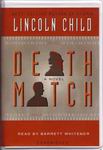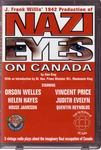
 Death Match
Death Match
By Lincoln Child; Read by Barrett Whitener
10 Cassettes – Approx 15 Hours [UNABRIDGED]
Publisher: Blackstone Audio
Published: 2004
ISBN: 0786128119
Themes: / Science Fiction / Technothriller / Mystery / Computers / Artificial Intelligence / Love /
What was it, exactly, she found so intimidating about the Thorpes? The fact they didn’t seem to need her friendship? They were well educated, but Maureen had her own cum laude degree in English. They had lots of money, but so did half the neighborhood. Maybe it was how perfect they seemed together, how ideally suited to each other. It was almost uncanny. That one time they’d come over, Maureen had noticed how they unconsciously held hands; how they frequently completed each other’s sentences; how they’d shared countless glances that, though brief, seemed pregnant with meaning. “Disgustingly happy” was how Maureen’s husband termed them, but Maureen didn’t think it disgusting at all. In fact, she’d found herself feeling envious.
From the title you might guess that Death Match is a novel set in the world of first person shooter computer games, and while that isn’t a bad idea in itself, this one has a premise even more unusual. Frankly, I’m amazed that no one else came up with this tale before now. It is so fundamental a science fiction idea – and so obviously possible in the near future, if not now – that it should have been explored in science fiction long before this. The premise goes something like… “What if you could use advanced computer technology and deep psychological testing to create a computer avatar of your own psyche – and then, using high speed data matching, run millions of pair bonding scenarios with other people’s avatars?” The purpose is to find the perfect match for a REAL life together. Once the two avatars are matched, each person associated with that avatar is given each other’s real life phone number and the knowledge that they are already perfectly matched! But this core idea isn’t on center stage, instead this is a mystery novel that reads like a technothriller in the tradition of Michael Crichton’s recent novels.
Christopher Lash, an ex-FBI forensic psychologist is hired by Eden Incorporated, the worlds premier couple matching service, to solve a mysterious double suicide of one of the company’s customers, the first “supercouple” created by avatar matching. To do the job properly Lash is familiarized with Eden’s patented software, going through the process of avatar creation himself, and then begins his “psychological autopsy” of the couple, which involves investigating what could have caused the world’s happiest couple to kill themselves. Just as his investigation gets into full swing – another couple dies! This can only mean that either something is wrong with Eden’s process or someone is murdering the world’s happiest people!
A few years ago I realized that eventually computer technology will solve a big pile of interesting problems. For instance, isn’t it a shame that Sean Connery couldn’t have done all of the James Bond films? Well, with computer technology it will be possible…. current celebrities and dead ones too will someday be reanimated, and recast in new movies. Imagine Humphrey Bogart paired with Harrison Ford for The Treasure Of The Sierra Madre: The Next Generation – (hey it might be good). We’re practically ready to do it with their physical images now, the big hurdle is voice mimicry – computer software is still very primitive when it comes to recreating someone’s voice. But mark my words it’ll happen… But I’d never thought of Lincoln Child’s use for computer technology, though it’s an obvious one, and certainly one that is starting to be developed. Websites like www.hotornot.com are using both physical images and keywords to match couples. Isn’t it reasonable to assume that the traditional matchmakers of old – and willy-nilly dating (like we have now) are going to be subsumed by computer matches that will find the best possible spouse given our personalities?
The idea of finding that special someone you were always destined to marry is alluring. Myself, Normally I’m someone who believes that the idea of finding your “one and only” is pure fantasy. Just given the sheer numbers of people we’ll never meet during our lifetimes it clearly can’t be that there is only one special someone in the world for everyone. But on the other hand Lincoln Child’s idea here might make that dream a reality. Because, not only does it allow you to select from every person alive, it also runs a lifetime’s worth of lives with each and every possible match in order to find the best match among all good matches. It truly would be heaven, wouldn’t it? Unfortunately we are not given the metaphysical run down on the consequences to this proposition, Lincoln Child’s novel isn’t deep, instead it is merely summer beach reading and ultimately unthoughtful. Myself I’d have much preferred a few fewer plot turns, I figured out whodunit quite early. An idea this good really deserves a truckload of metaphysical explorations: Whatever happened to the idea that marriage is about making an imperfect fit, fit anyway? Now that you mention it what makes people attracted to each other? What is love anyway? And hey, if we can brain map an avatar and run complete life scenarios using artificial intelligence in a computer do we have the right to delete that avatar? If computer programs can run our lives better than we can, what do we do with our time? Yikes! That last one has some truly scary implications.
Now perhaps I’m being to hard on this novel, its has some reasonably interesting discussions about artificial intelligence in it, it all makes sense, there are no leaps of logic and the characters, while a little flat, aren’t altogether unlikable. Child has obviously done some research and the including of such nuggets of detail are good, but I guess I just needed more fire and more thinking. The narrator, Barrett Whitener, does a nice job with the voices, but the essentially humorless nature of the novel doesn’t play to his strengths. Blackstone has used a slight variation on the original hardcover’s cover art, and as plain as it seems, that’s it there pictured above, it is an improvement over the bland layout used in the paper version. This is only Lincoln Child’s second novel written without his writing partner Douglas Preston. Together they wrote the novel The Relic, which was adapted into a decent horror movie of the same name. I can easily see Death Match being made into a TV movie, but honestly I don’t think it’d be one I’d set the VCR to record. Hopefully Child’s third solo novel will concentrate its focus on the science fiction elements rather than the technothriller/mainstream that he went for with this one.
Posted by Jesse Willis

 CBC RADIO ONE’s – Between The Covers program will be broadcasting the award winning author Kenneth Oppel’s latest novel “Airborn” (a wild adventure with some fantastic twists. AIRBORN is set in an alternate past, where air travel has followed the route of giant dirigibles rather than jet planes. The cabin boy of a luxury airship discovers a remarkable secret in the clouds high above the earth and must find a way to keep it – and his ship – out of the hands of unscrupulous men).
CBC RADIO ONE’s – Between The Covers program will be broadcasting the award winning author Kenneth Oppel’s latest novel “Airborn” (a wild adventure with some fantastic twists. AIRBORN is set in an alternate past, where air travel has followed the route of giant dirigibles rather than jet planes. The cabin boy of a luxury airship discovers a remarkable secret in the clouds high above the earth and must find a way to keep it – and his ship – out of the hands of unscrupulous men).
